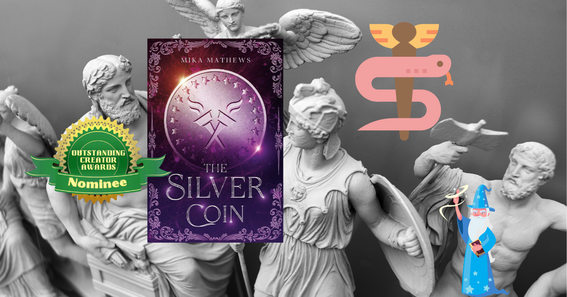|
Score: 93/100 (9.3 out of 10)
The Silver Coin by Mika Matthews is a fantasy/mythology novel that takes place after an apocalyptic war between the Greek gods of Olympus led by Hera and the mortals of Gaia (Earth). The world's human population was decreased to just one billion (by about 90%). The preceding generations consisted mostly of mixed-blooded demigods due to the gods intermingling with the surviving humans. It is implied that—following the trends of classic Greek myth—the gods may have done this in an unscrupulous manner. The main protagonist, Dante, is actually special and spectacular in a very interesting way: he really isn't special or spectacular at all. Unlike seemingly everyone else on Gaia, he isn't a demigod. He is overweight, depressed, and frail in more ways than one. However, what he does have is a strong sense of compassion and empathy. Death and suffering affect him in a way that doesn't seem to affect many of the gods and demigods, who generally turn a blind eye to these things. Dante seems to inherit a very special calling: to become a healer. A lot of this book concerns Dante's quest to becoming a capable enough healer (sort of like a white mage) in order to help his fellow people. Unfortunately, being a foolish mortal, he goes about doing this in probably the worst way possible: by essentially selling his soul to Hecate, the goddess of witches. Anyone who has read Macbeth or Dr. Faustus or who at least watched The Little Mermaid probably knows that this is an incredibly dangerous decision. You don't go selling your soul to demons or large, powerful Gothic women. It usually doesn't work out very well for you. This book definitely seems to have more edginess than The Princess, the Knight and the Lost God or any of the Percy Jackson books. There are several instances in which expletives are used. Death and destruction are taken rather seriously, although there is an afterlife component that does somewhat cheapen that. Also, the psychological and emotional issues that Dante is going through are quite raw. They seem real. And, furthermore, Dante is a character we can get understand and get behind because his struggles and thoughts are very familiar to readers. Anyone who has worked in healthcare or aspired to become a nurse or doctor has probably experienced a lot of the thoughts and feelings that Dante feels. In a lot of ways, this book serves as a powerful analogy for healthcare in general. And, thankfully, this is approached in a tactful, subtle, and non-preachy way. The most interesting thing about this book is how the Greek deities themselves are treated. They seem to have a little extra spice to them compared to other mythology books. It is interesting to see a ripped and jacked Aphrodite, paying homage to her role as a war god to the Spartans. It is interesting to see Hera being large and in charge, although it is strange that she is considered better than individual gods in the areas in which they specialize (i.e. “smarter than Athena, and crueler than Ares”). Similarly, Persephone is presented as a very overpowered character compared to her portrayal in the source material. She is actually portrayed as large and in charge in Hades, even called “stronger” and “meaner” than Hades. At the same time, Persephone might be the best character after Dante himself because Persephone somewhat serves as a foil to Dante. Persephone was simple and weak at one time, similar to Dante, yet became a queen who rules over the dead. While Dante is struggling to save lives, Persephone is forced to embrace death. This is not to say that Hades himself plays no role. His portrayal in this book might be one of the most accurate (to the source material). Hades is not pure evil. He is not the devil. Hades comes across like a grandfather and someone who is just doing his job, as grim as it may be. That's basically how Hades was most of the time in the original myths. Similar to what happened in The Princess, the Knight and the Lost God, circumstances and pent up frustrations have caused the gods of the sky and the lower worlds (the sea and the underworld) to be at odds. There is a subtle subtext to this, possibly serving as a criticism of human-triggered climate change, global warming, and pollution. Now, this book probably needs some work. Its current state is as an unformatted manuscript. There's something about the ending that doesn't seem... finished. That's not to say that the book itself isn't fun and entertaining (it is), but that maybe we're supposed to be expecting a sequel to tie up loose ends and continue the story. One thing we wanted to mention is that it is a little funny and also interesting to see the Greek gods interact with and ponder modern technologies like cell phones and weapons like bombs. Check this out on Amazon!
0 Comments
Leave a Reply. |
Archives
July 2024
Categories |

 RSS Feed
RSS Feed